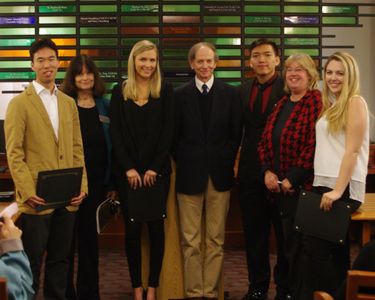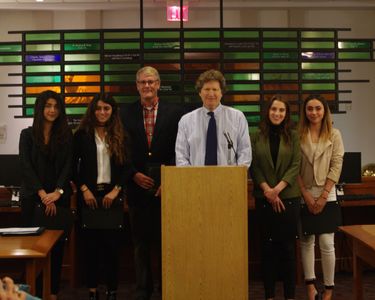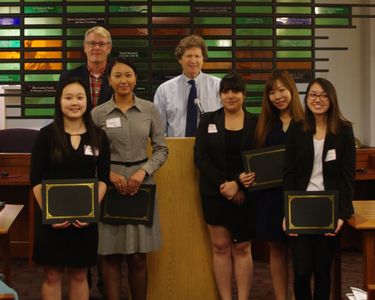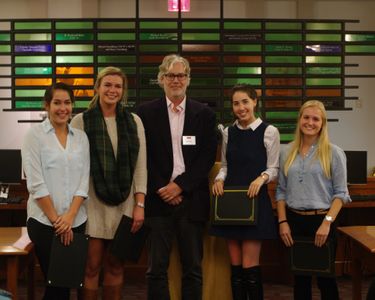2016 Capstone Award Winners Tackle Global and Local Problems
On October 21, Boston University College of General Studies celebrated the outstanding students who received awards for their Capstone projects. The Capstone project is a 50-page research term paper that CGS students complete in their sophomore year. It draw on two years of interdisciplinary studies as they work together as a team to synthesize data into a meaningful whole. The Capstone award is given annually to the team of students who present the best overall Capstone paper and defense. It is the highest honor bestowed upon a General Studies student for an academic project.
Team R: Maritime Mayhem: Solving the Disputes in the South China Sea
 Team R– Kyra Benavent, Alexa Cambi, Sandy Dumar, Nicole Ericson, Kevin Lee, and Cameron Sonn–examined the South China Sea, an area rich in resources and attractive to developing and established economies alike. The Team developed a proposal for the next administration that would limit the aggression of China and also allocate critical resources among the southeast Asian claimants to the territory. To resolve the conflicts peacefully, the group suggested that a council be created under the UN umbrella, including all the affected nations, to discuss the conflicts diplomatically. Faculty Susan Lee, Sally Sommers Smith, and Adam Sweeting said the group showed “thorough preparation and ability to think flexibly and creatively about the problems they had outlined.”
Team R– Kyra Benavent, Alexa Cambi, Sandy Dumar, Nicole Ericson, Kevin Lee, and Cameron Sonn–examined the South China Sea, an area rich in resources and attractive to developing and established economies alike. The Team developed a proposal for the next administration that would limit the aggression of China and also allocate critical resources among the southeast Asian claimants to the territory. To resolve the conflicts peacefully, the group suggested that a council be created under the UN umbrella, including all the affected nations, to discuss the conflicts diplomatically. Faculty Susan Lee, Sally Sommers Smith, and Adam Sweeting said the group showed “thorough preparation and ability to think flexibly and creatively about the problems they had outlined.”
Team S: A Report from the National Security Council on United States Intervention in the South China Sea

Team S– Timothy Choi, Lavinia Fung, Juan Pablo Nava, Jill Sullivan, John Sun, Tyler Takata, and Alyssa Vanliere–also examined policy in the South China Sea. Taking on the persona of the National Security Council, Team S’s Capstone group explained the complex relationship between Washington and Beijing as both seek control over the $5 trillion annual trade that passes through the contested waters. Faculty members June Grasso, Kari Lavalli, and Robert Wexelblatt said that the “remarkably successful” project “offered a balanced approach that emphasizes multilateral discussions and a major role for the United Nations in protecting freedom of the seas.”
Team T: Solving the MBTA Disaster
 Team T – Sarah Beaulieu, Max Biel, Sophie Collender, Dan Erdman, Albert Jiminez, Camilla Kempainen, Emily Kim, and Emma Rinaldi– took a deep dive into the economics, history and politics of the T. They conducted interviews with MBTA employees and managers, created a detailed financial plan, and according to their professors, went the extra mile in their research and writing. “Their plan was enormously impressive,” said professors Sandra Buerger, Jeffery Vail, and Thomas Whalen. “It was pragmatic, thorough, and brilliantly conceived. If only this group of students was put in charge of fixing the MBTA.”
Team T – Sarah Beaulieu, Max Biel, Sophie Collender, Dan Erdman, Albert Jiminez, Camilla Kempainen, Emily Kim, and Emma Rinaldi– took a deep dive into the economics, history and politics of the T. They conducted interviews with MBTA employees and managers, created a detailed financial plan, and according to their professors, went the extra mile in their research and writing. “Their plan was enormously impressive,” said professors Sandra Buerger, Jeffery Vail, and Thomas Whalen. “It was pragmatic, thorough, and brilliantly conceived. If only this group of students was put in charge of fixing the MBTA.”
Team U: Operation Cooperative Destruction: The Defeat of Isis
 Team U — Lana Darwan, Daniel DeBernardis, Rana Kheradmandan, Serena Lipton, Cameron McMillan, Serina Mehrian, and Charles Morrison–constituted itself as a panel of experts advising the Obama administration and its successor on a strategy first to destroy the Islamic State and then to remove from power the Assad regime in Syria. Mostly complimentary but also somewhat critical of President Obama’s current strategy, these experts recommend an increase in the intensity of the air campaign and larger-scale support for the local forces fighting on the ground. Professors Kevin Stoehr and William Tilchin said, “This Capstone paper is characterized by extensive research, thoughtful and well-argued analysis, very good writing, and professional quality formatting.”
Team U — Lana Darwan, Daniel DeBernardis, Rana Kheradmandan, Serena Lipton, Cameron McMillan, Serina Mehrian, and Charles Morrison–constituted itself as a panel of experts advising the Obama administration and its successor on a strategy first to destroy the Islamic State and then to remove from power the Assad regime in Syria. Mostly complimentary but also somewhat critical of President Obama’s current strategy, these experts recommend an increase in the intensity of the air campaign and larger-scale support for the local forces fighting on the ground. Professors Kevin Stoehr and William Tilchin said, “This Capstone paper is characterized by extensive research, thoughtful and well-argued analysis, very good writing, and professional quality formatting.”
Team U: The South China Sea: A Policy Recommendation

The second winning team–Alyssa Chao, Rhea Kumar, Manting Li, Maria Lim, Phyllis Tang, Regenie Tee, and Jenny Trinh– constituted itself as the Research Committee for United States-Pacific Relations, advising Secretary of State John Kerry and his successor on a strategy for addressing China’s far-reaching claims of sovereignty over the South China Sea. To set the stage for its policy recommendation, this research committee discussed the historical background of the South China Sea issue and several nations’ strong desire for American diplomatic and military support. Faculty wrote, “This Capstone paper is notable for wide-ranging research, sober and sophisticated analysis, very good writing, and exceptional professionalism.”
Team V: Mitigating Food Insecurity: Using Kenya As a Pilot
 Team V–Stefanie Anderson, Cassie Cohen, Hannah Freund, Aaron Lipp, Ashley Munroe, Elizabeth Pentikis– proposed innovative solutions to the lack of an adequate supply of healthy food. The team suggested the use of 21st century computing and telecommunications technologies–using “big data” to optimize the use of the scarce resources of the Kenya environment. Their proposal aimed to help feed a population living under challenging physical and political circumstances, in a way that is both scalable and transferable to other regions of Africa and elsewhere in the world. Faculty Gregg Jaeger, Michael Kort, and Joellen Masters said, “The group’s final paper was intelligently organized and beautifully written, and was strongly defended and supported in the oral defense phase under sharp questioning.”
Team V–Stefanie Anderson, Cassie Cohen, Hannah Freund, Aaron Lipp, Ashley Munroe, Elizabeth Pentikis– proposed innovative solutions to the lack of an adequate supply of healthy food. The team suggested the use of 21st century computing and telecommunications technologies–using “big data” to optimize the use of the scarce resources of the Kenya environment. Their proposal aimed to help feed a population living under challenging physical and political circumstances, in a way that is both scalable and transferable to other regions of Africa and elsewhere in the world. Faculty Gregg Jaeger, Michael Kort, and Joellen Masters said, “The group’s final paper was intelligently organized and beautifully written, and was strongly defended and supported in the oral defense phase under sharp questioning.”
Team W: Pivot or Quit It: Readdressing the US-Japan Alliance and the Growing Security Dilemma in the Pacific
 Team W–Javier Barajas, Hal Edwards, Gabriela Falla, Ryotara Kusomoto, Sharon McDermott, Christian Tantoco, and Honoka Watanabe–examined the effect of China’s rise as a Great Power on the US-Japanese relationship, specifically its security aspects. The group began with a historical background and comprehensive overviews of each country’s interests in the Asia-Pacific region. After laying out the disagreements that exist between the three powers, the group constructed an intriguing and notably sophisticated policy proposal. Faculty Leonard Andres, Neal Leavitt, and Benjamin Varat said, “A massive joint research effort led to a broad and deep understanding of their topic, all of which underpinned an unusually subtle and realistic policy proposal.”
Team W–Javier Barajas, Hal Edwards, Gabriela Falla, Ryotara Kusomoto, Sharon McDermott, Christian Tantoco, and Honoka Watanabe–examined the effect of China’s rise as a Great Power on the US-Japanese relationship, specifically its security aspects. The group began with a historical background and comprehensive overviews of each country’s interests in the Asia-Pacific region. After laying out the disagreements that exist between the three powers, the group constructed an intriguing and notably sophisticated policy proposal. Faculty Leonard Andres, Neal Leavitt, and Benjamin Varat said, “A massive joint research effort led to a broad and deep understanding of their topic, all of which underpinned an unusually subtle and realistic policy proposal.”
Team Y: Sustain Our Home
 Team Y–Lily Hillstrand, Alana King, Kate Lawrence, Caroline Melville, Stefanie Rubin, Sophie Spare, and Emily Wiens–ambitiously tackled the difficult problem of food insecurity, focusing their efforts primarily on the Western Highlands region of Guatemala. After researching preexisting American food programs such as Food for Peace and Feed the Future, this group proposed its own program, under the auspices of their fictionalized non-profit organization called Sustain Our Home. Faculty members John Mackey and Robert Schoch said, “The members of Sustain Our Home demonstrated not only strong research skills, but also creative interdisciplinary thinking abilities and a high degree of originality.”
Team Y–Lily Hillstrand, Alana King, Kate Lawrence, Caroline Melville, Stefanie Rubin, Sophie Spare, and Emily Wiens–ambitiously tackled the difficult problem of food insecurity, focusing their efforts primarily on the Western Highlands region of Guatemala. After researching preexisting American food programs such as Food for Peace and Feed the Future, this group proposed its own program, under the auspices of their fictionalized non-profit organization called Sustain Our Home. Faculty members John Mackey and Robert Schoch said, “The members of Sustain Our Home demonstrated not only strong research skills, but also creative interdisciplinary thinking abilities and a high degree of originality.”